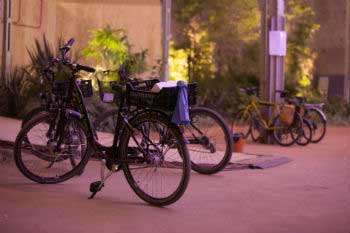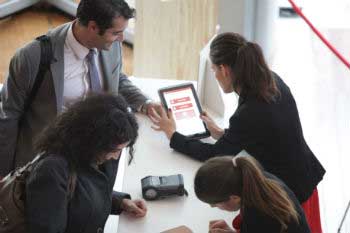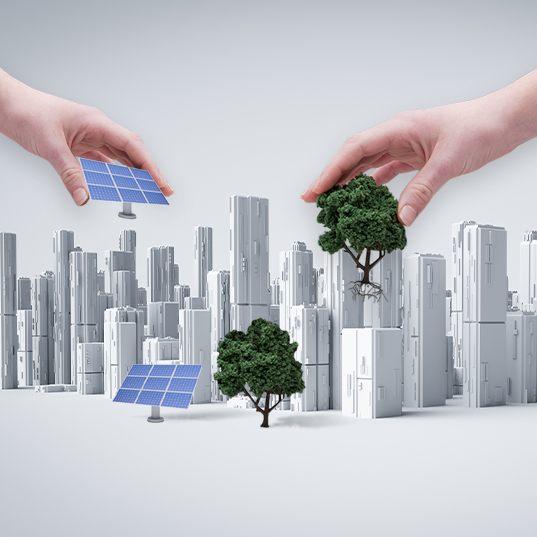How to organize a sustainable event?
Vicky Martín – of ACCIONA Producciones y Diseño – tell us about the latest trends and innovations in the sector.Sustainability is reaching every area, and sustainable event management is beginning to find a niche in our society.

We have spoken to Vicky Martín – responsible for communications and sustainability at ACCIONA Producciones y Diseño – and asked her to tell us about the latest trends and innovations in the sector and clear up any doubts about how and why we should organise a sustainable event.
Interviewer (I): Roughly speaking, how can we briefly explain the notion of a “sustainable event?
V: A sustainable event is one that considers the negative impact on the environment where it takes place, and tries to minimise it to the lowest possible level in order to produce the lowest environmental impact in the event´s surroundings. Organising such an event reduces a high level of resource consumption in a short period of time (water, energy, food, paper), reduces waste generation, and prevents an increase in CO2 emissions produced by transport and accommodation, among other things. But the event also has to be able to leave a positive legacy both socially and economically in the community where it is held.
I: The Olympics and Paralympics in London have been the most sustainable games in history. Has there been any increase in the global demand for this kind of events? Are there any sectors more sensitive to it?

V: There is certainly a greater awareness of the need for implementing sustainable practices in events, but my own experience tells me that sustainability in Spain is not yet among the customers´ top concerns as there is still a belief that “being sustainable is expensive,” though there are more and more agencies, dealers, OPC, hotels, town halls, conventions bureau and associations that are promoting sustainability from their action areas contributing to the transformation of the sector.
Looking outside our national borders, such as in the US, England, Germany, Denmark or Switzerland, I have met customers and markets highly committed to sustainable event management. In fact, some include contractual conditions which bind people to apply sustainable criteria when it comes to designing and organising the event.
I: What other benefits, besides preserving the environment, are there for a company that organises sustainable events?

V: As opposed to the general view, organising events in a sustainable way is not more expensive. Controlling and reducing the level of resource consumption make us more efficient in our productive processes, which certainly results in time and cost saving. From the company´s point of view, it also brings a value added; it makes us more competitive. And an extra advantage is that it helps a company project an institutional image consistent with its principles of corporate social responsibility.
I: What is the greatest innovation you have introduced in some of those events so far?
V: For example, an iPad application which enabled guests to know about their carbon footprint or C02 emitted according to the means of transport they had used to go to the event. For the “Día de la Música” festival, we encouraged the audience to exchange used plastic cups for books and magazines under the slogan “turn your waste into culture.”
We have also planned to calculate those avoided emissions. This will let us compare and analyse a sustainable event more precisely.
I: Give us some tricks or techniques, for example, for reducing the carbon footprint when organising or choosing a catering service.

V: The catering choice is a very important one; that is why we should consider using local, in-season, organic or fair-trade products. In order to minimise the negative impact it is necessary to reduce wastes, avoid bottles and packages containing small quantities and a proper management of these, reusable dishes and cutlery, insisting on using bulk dispensers and jugs for food and drinks, and also, but not least, it is necessary to remove any physical or sensory barrier, making sure that everyone can access and enjoy catering services at the event.
I: What about the lighting techniques?
V: First of all, we always have to insist on using LED lights because they raise energy efficiency and reduce carbon footprints. It is also important to choose outdoor places with natural light, schedule the event in summertime and make the most of natural light.
I: What is a “carbon-neutral” event?
V: A totally sustainable event does not exist; there will always be emissions which cannot be prevented. A “carbon-neutral” event is one that considers those unavoidable emissions produced by the event. These are calculated and compensated by buying voluntary carbon credits coming from a project with clear environmental, social and economic advantages, making the final emission balance equal zero.
I: Any tips for organising private events (small celebrations) in a more sustainable way?
V: I always say that you only have to use your common sense for being sustainable. I would like to remind us of the idea that the sum of many small actions can make a real difference.

Some tips can be: Avoiding disposable dishes and cutlery; bottles containing small quantities and overpackaging; using tap water and putting it in jugs; sorting out the waste according to its kind and taking it to the right container; consuming local, in-season and/or organic products; insisting on natural light; using the right air-conditioning; avoiding printing on paper; decorative items that are reusable and recyclable; providing guests with information about those forms of transport available for going to the event, thus making possible for guests to use public transport; ensuring accessibility without physical or sensory barriers that prevent anyone from joining the event like the rest; not playing the music so loudly to avoid trouble in the neighbourhood, etcetera. As you may have seen, these are aspects that consider the environmental, economic and social perspectives, that is, the three main points of sustainability properly understood. Besides, these are tips easy to put into practice and certainly do their bit in the fight against climate change.
More information: ACCIONA Producciones y Diseño, @accionaAPD







